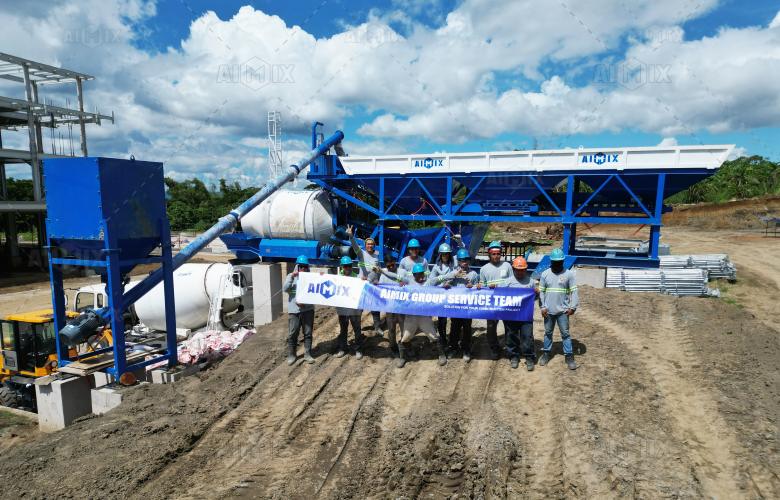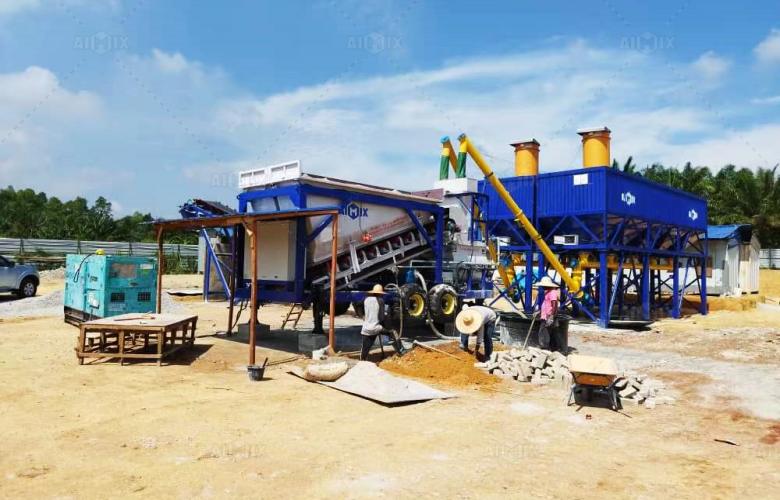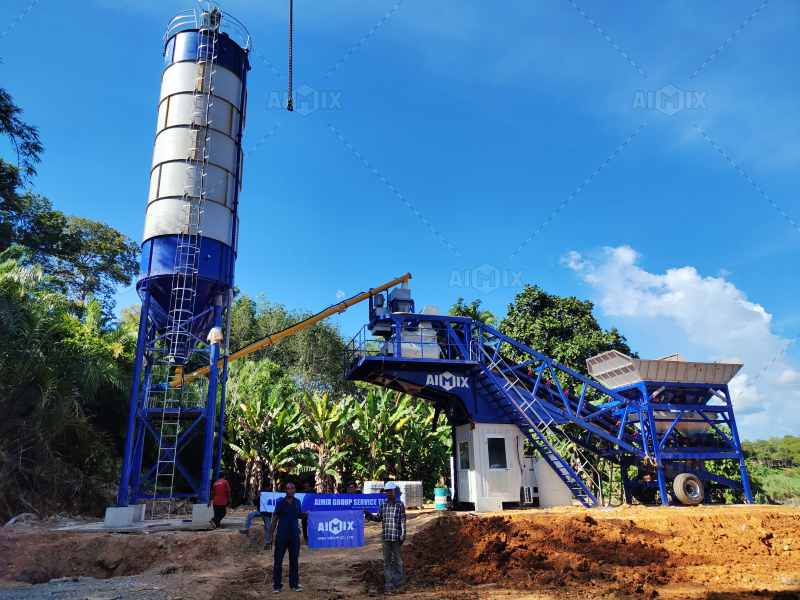In the competitive world of construction, meeting deadlines and staying within budget are often the top priorities for contractors and project managers. Portable concrete plants have become a game-changer for the construction industry, offering flexibility, mobility, and cost-saving benefits that stationary plants simply can’t match. Whether you’re working on a remote site, need flexibility in production, or want to reduce transportation costs, portable concrete plants can offer solutions that boost productivity while maintaining high-quality concrete output.
This article explores how portable concrete plants help construction businesses meet tight deadlines and cut down on transportation costs. We will also discuss the factors influencing concrete batching plant prices, the concrete batching plant for sale market, and the role of batching plant equipment in the success of construction projects.

What is a Portable Concrete Plant?
A portable concrete plant, also known as a mobile batching plant, is a self-contained unit that produces ready-mix concrete on-site. These plants are equipped with all the necessary machinery, including mixers, aggregate bins, cement silos, and control systems, and can be relocated from one site to another with minimal effort. Portable concrete plants are designed for small- to medium-sized construction projects, making them ideal for areas where traditional concrete delivery methods would be costly or inefficient.
The mobility of portable concrete plants allows contractors to set up and start producing concrete within a short time frame. The compact design of these plants also makes them ideal for projects in urban areas with space constraints. By mixing concrete on-site, portable plants can eliminate the need for costly transportation and reduce the risk of material wastage caused by long delivery times.
Meeting Tight Deadlines with Portable Concrete Plants
One of the primary challenges in construction is meeting deadlines. Delays in concrete delivery can result in expensive project slowdowns. Traditional ready-mix concrete suppliers often face issues such as traffic delays, limited delivery windows, or last-minute changes in order quantities. These challenges can make it difficult to stay on schedule and may even cause project completion to be delayed.
Portable concrete plants provide a solution by producing concrete exactly when and where it is needed. Since the plant is located on-site, there is no need to rely on external suppliers for concrete delivery. This eliminates the risks associated with delivery delays and ensures that contractors can always access fresh, high-quality concrete on demand.
By producing concrete on-site, portable plants also help minimize downtime between tasks. For instance, workers can begin laying concrete immediately after it is mixed, instead of waiting for a truck to arrive with the batch. This faster turnaround not only helps keep the project on schedule but also allows contractors to allocate resources more efficiently, ultimately reducing labor costs and increasing overall project efficiency.
Moreover, portable plants enable better control over the quality of concrete. Adjustments to the mix can be made quickly and easily, ensuring that the concrete meets the specific requirements of the project. This flexibility can lead to fewer errors and rework, further ensuring that deadlines are met.

Reducing Transportation Costs with Portable Concrete Plants
Transportation costs can account for a significant portion of the expenses involved in delivering concrete to a construction site. Ready-mix concrete suppliers often charge for transportation, and long-distance deliveries can significantly increase costs. For remote or hard-to-reach construction sites, transporting concrete can become particularly expensive and inefficient. Portable concrete plants help contractors reduce these transportation costs in several ways:
- Eliminating Delivery Fees: With portable concrete plants, there is no need to rely on a third-party delivery service. The plant is located on-site, and the concrete is mixed and delivered directly to the point of use. This cuts out the need for delivery trucks, reducing transportation expenses and potential delays.
- Minimizing Concrete Waste: Traditional delivery methods can result in concrete waste if the material is not used before it hardens. When concrete is transported over long distances, there’s also the risk of mix variation and delays that lead to wastage. With portable plants, contractors can precisely control the amount of concrete produced, minimizing waste and reducing costs.
- Optimal Material Use: Portable concrete plants can produce the exact quantity of concrete required for each phase of the project. Since the plant is right on-site, contractors can adjust the mix as needed, ensuring that concrete is fresh and that excess material is avoided. This level of control allows for more efficient material management, reducing unnecessary costs.
Concrete Batching Plant for Sale: Key Considerations
When looking for a concrete batching plant for sale, whether portable or stationary, there are several important factors to consider. First, evaluate the plant’s production capacity. Portable plants vary in size and output, so it is essential to choose one that can meet the specific needs of your project. Factors such as batch size, aggregate storage capacity, and the speed at which the plant can produce concrete should be considered to ensure optimal performance.
Another factor to consider is the plant’s mobility. Not all portable concrete plants are designed the same way. Some are highly mobile, allowing for quick setup and relocation, while others may require more time and effort to move. If your project involves frequent relocation, it’s important to choose a plant that offers easy portability.
Durability and reliability are also critical considerations. The plant should be able to handle the demands of constant use in harsh environments. Ensure that the plant is built with high-quality materials and that it complies with local industry standards.

Concrete Batching Plant Prices: What to Expect
Concrete batching plant prices can vary widely depending on the type, capacity, and features of the plant. For small to medium-sized portable concrete plants, prices typically range from $20,000 to $150,000. The price can increase with added features such as automated controls, more advanced batching equipment, and higher production capacities. For larger or more specialized plants, the cost may exceed $200,000 or more.
When considering the price of a concrete batching plant, it’s essential to factor in the long-term savings that the plant will provide. While the upfront cost may seem high, the reduction in transportation fees, concrete waste, and downtime can lead to significant savings over time. Additionally, a mobile batching plant allows for greater control over concrete quality, which can help prevent costly mistakes and delays.
Batching Plant Equipment: Maximizing Efficiency
The efficiency of a portable concrete plant relies heavily on the batching plant equipment it uses. Key components such as the mixer, aggregate bins, cement silos, and control systems all play an important role in ensuring smooth operations. The efficiency of the batching equipment directly impacts how quickly and accurately concrete can be mixed and delivered on-site.
Modern portable plants often come equipped with advanced control systems that allow operators to monitor and adjust the batching process remotely. This automation reduces the chances of human error, improves mix consistency, and speeds up the overall production process.
Conclusion
Portable concrete plants are an excellent choice for construction projects that require flexibility, mobility, and cost savings. By producing concrete on-site, these plants help contractors meet tight deadlines, reduce transportation costs, and improve material efficiency. When considering a concrete batching plant for sale, it’s important to evaluate the plant’s capacity, mobility, and quality of equipment to ensure it meets your project’s needs. With the right equipment and careful planning, portable concrete plants can provide significant benefits, ensuring timely project completion and cost-effective operations.